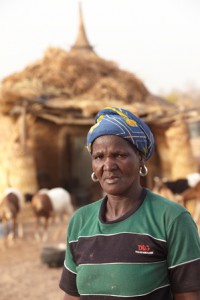Sahel food crisis: Tackling the problem, garden by garden
You’ve got to admire the focus and drive of a woman like Noaga Yambeogo. She’s a 50-year-old widow in Tansoba, a village in the center north region of Burkina Faso where more than two million people are struggling with a food crisis. They are among more than 18 million across the Sahel region of West Africa hit by the crisis.

But for about 32 women here, hope has arrived one steady drop at a time—through a drip irrigation system that Oxfam and its partner, ATAD, with support from the European Union, have helped to install. It’s part of a development of six areas with market gardens that are allowing 200 women to grow produce to feed their families and to sell.
In Tansoba, Yambeogo, who has four children, is president of the women’s cooperative.
“I was elected because I work hard,” she says. “They thought I could push them to do a good job because I love working myself.”
Anyone who has ever had a vegetable garden knows how labor-intensive it can be, especially if your goal is to produce enough to make a bit of income. And for the women here, the stakes are as high as they can get: The health of their children may depend on what they can coax from the ground.
“When we have food, we cook it for our children and if there is none, we ask them to be patient. I have lost count of the number of days I haven’t been able to feed my children,” says Yambeogo. “The garden can help us solve the problem of hunger. Although this is difficult, we are ready to work on it so our children will have something to eat.”
This is the first time that Yambeogo and the other women have tried market gardening. She is determined to succeed—and to give her children a future.
“If we carry this gardening work well, there will be no more starvation,” she says. “When my children are hungry, I can pick vegetables and feed my children with them. This gardening will help us pay our children’s tuition fees and buy them clothes and shoes. I want my children to succeed at school.”
Oxfam is aiming to help 1.2 million people across seven countries with programs that include cash transfers and cash-for-work initiatives, veterinary care for the livestock on which many families depend, and access to clean water and sanitation. We are also campaigning to change the root causes of this crisis. Find out how you can support our efforts.